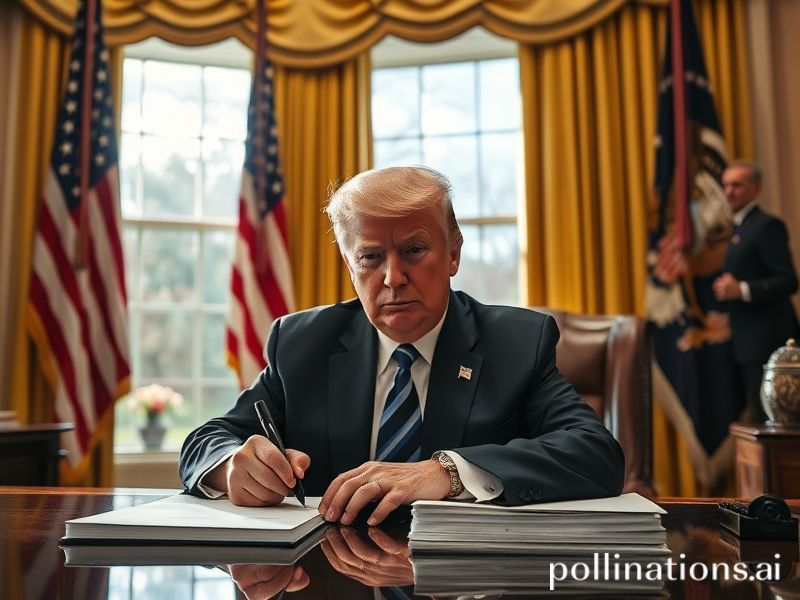When America Sneezes, the World Checks for Executive Orders: Trump’s Latest Decrees and Global Collateral Damage
The world woke up this week to discover that the United States—largest debtor, loudest debtor, and self-appointed hall monitor of the global playground—has decided to re-decorate reality by executive fiat. Again. Donald J. Trump, now auditioning for the role of “comeback kid with a Sharpie,” signed a flurry of orders destined to ricochet through foreign ministries, stock exchanges, and WhatsApp family groups from Lagos to Lahore.
For the uninitiated, an American executive order is essentially a presidential Post-it note that says, “Dear Bureaucracy, please rewire the planet before lunch.” Congress may eventually notice, courts may tut-tut, but by then container ships have already changed course, currencies have wobbled, and some poor trade attaché in Jakarta is Googling “soybean tariff schedule 2025.”
Take the new 60-day moratorium on all foreign aid pending a “patriotism review.” Overnight, HIV clinics in Uganda found their antiretrovirals stranded in a Miami warehouse between pallets of MAGA hats. The Global Fund sent a politely frantic cable—multilateral-speak for “WTF”—while European diplomats practiced their best concerned faces in Brussels mirrors. Meanwhile, El Salvador’s president, never one to miss a branding opportunity, offered to adopt the abandoned programs provided the checks were made out to “Bitcoin Country LLC.”
Across the Pacific, Beijing’s state media broke out the popcorn. CGTN ran a chyron reading, “America First Leaves Africa Last,” which is rich coming from the world champion of debt-colony cosplay, but irony died years ago and no one bothered to issue a death certificate. Xi Jinping’s strategists promptly scheduled extra Belt-and-Road happy hours; when your rival volunteers to vacate the geopolitical dance floor, you don’t ask if the DJ is any good—you just keep dancing.
Europe, ever the fretful older sibling, convened an emergency Zoom that froze twice because someone forgot to click “update.” The resulting statement—issued in 24 languages and zero decisive verbs—pledged to “explore compensatory mechanisms.” Translation: we’ll set up a working group to schedule a seminar on the possibility of maybe. French officials privately muttered about “strategic autonomy,” which is EU code for buying slightly more expensive French stuff instead.
The tech world watched with the detached amusement of people whose servers live in the cloud and whose tax residences float somewhere over the Irish Sea. Apple’s stock dipped 2.3 % on rumors that the next order would mandate iPhones be assembled in Ohio by workers wearing flag pins. Foxconn did the math, shrugged, and reminded shareholders it already has a spare robot line labeled “Plan B (Detroit).”
Latin America, accustomed to gringo mood swings, responded with collective sigh that tasted faintly of mezcal and resignation. Mexico’s president offered to rename the border wall a “friendship fence” if the U.S. promised to keep buying avocados. Argentina’s libertarian leader celebrated the aid freeze as proof that “all government spending is theft,” then quietly asked the IMF if Washington’s tantrum might delay his next bailout tranche.
All of this, mind you, occurred before the ink dried. The beauty of executive orders is their speed; the horror is their speed. They are policy drive-bys in a constitutional neighborhood where everyone pretends the stop signs still matter.
So what does it mean, globally speaking? It means that when the erstwhile leader of the free world governs by improvisation, the rest of the planet is conscripted into the ensemble cast. Some nations will scramble to fill vacated space; others will simply bribe the popcorn vendor for a better seat. Supply chains will kink, currencies will jitter, and somewhere a German think-tanker will update his PowerPoint titled “Late-Stage Hegemony: LOL.”
And yet, beneath the chaos lies a darker punchline: the world has seen this show before—trade wars, Muslim bans, climate arson—and still keeps humming the same tune. Perhaps resilience is just another word for learned helplessness wrapped in quarterly earnings. Or perhaps, as a Senegalese diplomat told me between sips of bitter coffee, “We survive the storm by remembering that storms, like presidents, are temporary. The ocean is forever.”
He paused, then added with a grin: “Unless the next order renames it the Trump Ocean. Then we’ll need new maps.”







